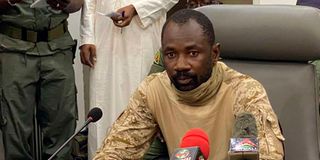Kenya leads UN Security Council delegation to Mali over transition crisis

Colonel Assimi Goita, who is Mali's interim President.
Kenya is leading a UN Security Council delegation to Mali to discuss transition from a crisis occasioned by a coup earlier last year.
The Council’s representatives under the Kenyan Presidency on Saturday called on Mali’s junta to stick to the transition plan supported by the Economic Community of West African States (Ecowas) which calls for the conduct of elections and transfer power to an elected civilian administration early next year.
Dr Martin Kimani, Kenya’s Permanent Representative to the UN, and who has been presiding over the Council’s meetings this October, said the team was in Mali “to show solidarity” with all stakeholders carrying out transition in the country.
“As a fellow African country, the situation in Mali and the Sahel is dear to us. We are concerned with the growing insecurity in the region, and the spread of terrorism and its impact on civilians,” Dr Kimani told journalists on arrival in Bamako, the Malian capital. The Council, he pledged, will continue its “unwavering” support for the troubled country.
The Council was supposed to meet with leaders of the transitional junta, representatives of the UN, diplomats as well as youth and civil activists in the country.
Reforms
“[I have ] Heard of a young population desiring reforms that deliver livelihoods; a humanitarian crisis; & the negative impact of climate change. Change here requires security, which requires maximum pressure against terrorist groups,” Kimani added on Sunday.
The visit comes amidst growing uncertainty about the prospect of holding the election, less than four months before the deadline imposed by the regional bloc, Ecowas.
Mali has been under military rule since August 2020, when soldiers ousted the government of former President Ibrahim Boubacar Keita. The coupists were forced to establish a transition administration headed by civilians, in the face of sanctions by Ecowas. But 10 months into the transition, the military again seized power, after accusing the civilian authorities of reneging on the transition charter.
Since the second coup in May this year, coup leader Col Assimi Goita has been in full charge, running the country as president alongside an appointed civilian Prime Minister.
The presidential election is scheduled for 27 February, according to the Ecowas deadline. But before that the transition administration is expected to fulfill a number of requirements, including constitutional review.
But supporters of the junta say the initial 18-month deadline wasn’t enough to carry out all those tasks. In recent weeks senior officials within the military and the civilian authorities have become increasingly open about their support for extension.
Transition deadline
Saturday’s visit by the Security Council officials comes about a week after a similar one by a high profile Ecowas delegation headed by the bloc’s chairperson, Ghanaian President Nana Akufo-Addo, seeking to emphasize its position on the transition deadline.
The UN delegation reiterated that position in a statement delivered to the press by Kenya’s ambassador to the UN, Martin Kimani.
Kenya is chairing the Security Council in the month of October.
Mr Kimani said the visit was meant to show solidarity to and assess the progress made by the UN mission in Mali, MINUSMA.
“We are here to listen to the transition authorities and determine the best way to support them in their efforts to fully realize this transition,” said Mr Kimani, adding: “We also come with clear messages on the need to organize the elections, implement the peace agreement and stabilize the center of Mali.”
The delegation is co-led by the ambassadors of Niger and France to the UN, Abdou Abarry and Nicolas de Rivière. It also includes the US ambassador to the UN, Linda Thomas-Greenfield.
The 15-member delegation that also includes diplomats from China, Russia and India is scheduled to meet with the transition president and other top government officials, as well as the armed groups that signed the 2015 peace agreement and civil society representatives.
Mali is faced with a jihadist insurgency and communal violence, which have all contributed to complicating the transition process.
The junta’s approach to dealing with the insecurity has further aggravated concerns of the international community.
Western powers
The UN and Western powers are concerned about Bamako’s intention to enlist the services of a private Russian military group in its fight against insecurity in the vast landlocked Sahelian country.
Since 2012, the Islamist insurgency has swept into center of the country and spilled over into neighbouring Burkina Faso and Niger. The ensuing cross border conflict has left thousands dead and hundreds of thousands displaced.
The UN mission, MUNISMA, was established in 2013 as one of several intervention forces operating the country, alongside French forces. Rights groups have also questioned the junta’s handling of the war.
The UN delegation’s visit also comes as Human Rights Watch (HRW) called on Malian authorities to investigate alleged rights violations, including executions and disappearances involving security forces.
The rights watchdog called on the Security Council to “use its visit to ensure that the government honours its human rights obligations, investigates abuses by all parties and prosecutes appropriately" all those found wanting.
The UN delegation is expected to fly to neighbouring Niger on Sunday.





